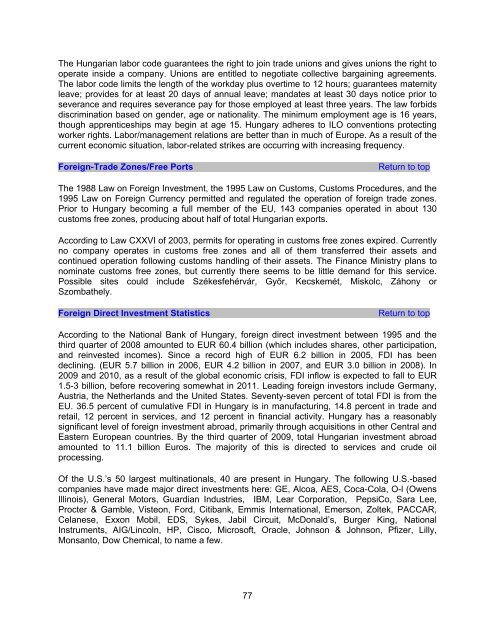Doing Business in Hungary 2010 - International Franchise Association
Doing Business in Hungary 2010 - International Franchise Association
Doing Business in Hungary 2010 - International Franchise Association
You also want an ePaper? Increase the reach of your titles
YUMPU automatically turns print PDFs into web optimized ePapers that Google loves.
The Hungarian labor code guarantees the right to jo<strong>in</strong> trade unions and gives unions the right to<br />
operate <strong>in</strong>side a company. Unions are entitled to negotiate collective barga<strong>in</strong><strong>in</strong>g agreements.<br />
The labor code limits the length of the workday plus overtime to 12 hours; guarantees maternity<br />
leave; provides for at least 20 days of annual leave; mandates at least 30 days notice prior to<br />
severance and requires severance pay for those employed at least three years. The law forbids<br />
discrim<strong>in</strong>ation based on gender, age or nationality. The m<strong>in</strong>imum employment age is 16 years,<br />
though apprenticeships may beg<strong>in</strong> at age 15. <strong>Hungary</strong> adheres to ILO conventions protect<strong>in</strong>g<br />
worker rights. Labor/management relations are better than <strong>in</strong> much of Europe. As a result of the<br />
current economic situation, labor-related strikes are occurr<strong>in</strong>g with <strong>in</strong>creas<strong>in</strong>g frequency.<br />
Foreign-Trade Zones/Free Ports Return to top<br />
The 1988 Law on Foreign Investment, the 1995 Law on Customs, Customs Procedures, and the<br />
1995 Law on Foreign Currency permitted and regulated the operation of foreign trade zones.<br />
Prior to <strong>Hungary</strong> becom<strong>in</strong>g a full member of the EU, 143 companies operated <strong>in</strong> about 130<br />
customs free zones, produc<strong>in</strong>g about half of total Hungarian exports.<br />
Accord<strong>in</strong>g to Law CXXVI of 2003, permits for operat<strong>in</strong>g <strong>in</strong> customs free zones expired. Currently<br />
no company operates <strong>in</strong> customs free zones and all of them transferred their assets and<br />
cont<strong>in</strong>ued operation follow<strong>in</strong>g customs handl<strong>in</strong>g of their assets. The F<strong>in</strong>ance M<strong>in</strong>istry plans to<br />
nom<strong>in</strong>ate customs free zones, but currently there seems to be little demand for this service.<br />
Possible sites could <strong>in</strong>clude Székesfehérvár, Gyõr, Kecskemét, Miskolc, Záhony or<br />
Szombathely.<br />
Foreign Direct Investment Statistics Return to top<br />
Accord<strong>in</strong>g to the National Bank of <strong>Hungary</strong>, foreign direct <strong>in</strong>vestment between 1995 and the<br />
third quarter of 2008 amounted to EUR 60.4 billion (which <strong>in</strong>cludes shares, other participation,<br />
and re<strong>in</strong>vested <strong>in</strong>comes). S<strong>in</strong>ce a record high of EUR 6.2 billion <strong>in</strong> 2005, FDI has been<br />
decl<strong>in</strong><strong>in</strong>g. (EUR 5.7 billion <strong>in</strong> 2006, EUR 4.2 billion <strong>in</strong> 2007, and EUR 3.0 billion <strong>in</strong> 2008). In<br />
2009 and <strong>2010</strong>, as a result of the global economic crisis, FDI <strong>in</strong>flow is expected to fall to EUR<br />
1.5-3 billion, before recover<strong>in</strong>g somewhat <strong>in</strong> 2011. Lead<strong>in</strong>g foreign <strong>in</strong>vestors <strong>in</strong>clude Germany,<br />
Austria, the Netherlands and the United States. Seventy-seven percent of total FDI is from the<br />
EU. 36.5 percent of cumulative FDI <strong>in</strong> <strong>Hungary</strong> is <strong>in</strong> manufactur<strong>in</strong>g, 14.8 percent <strong>in</strong> trade and<br />
retail, 12 percent <strong>in</strong> services, and 12 percent <strong>in</strong> f<strong>in</strong>ancial activity. <strong>Hungary</strong> has a reasonably<br />
significant level of foreign <strong>in</strong>vestment abroad, primarily through acquisitions <strong>in</strong> other Central and<br />
Eastern European countries. By the third quarter of 2009, total Hungarian <strong>in</strong>vestment abroad<br />
amounted to 11.1 billion Euros. The majority of this is directed to services and crude oil<br />
process<strong>in</strong>g.<br />
Of the U.S.’s 50 largest mult<strong>in</strong>ationals, 40 are present <strong>in</strong> <strong>Hungary</strong>. The follow<strong>in</strong>g U.S.-based<br />
companies have made major direct <strong>in</strong>vestments here: GE, Alcoa, AES, Coca-Cola, O-l (Owens<br />
Ill<strong>in</strong>ois), General Motors, Guardian Industries, IBM, Lear Corporation, PepsiCo, Sara Lee,<br />
Procter & Gamble, Visteon, Ford, Citibank, Emmis <strong>International</strong>, Emerson, Zoltek, PACCAR,<br />
Celanese, Exxon Mobil, EDS, Sykes, Jabil Circuit, McDonald’s, Burger K<strong>in</strong>g, National<br />
Instruments, AIG/L<strong>in</strong>coln, HP, Cisco, Microsoft, Oracle, Johnson & Johnson, Pfizer, Lilly,<br />
Monsanto, Dow Chemical, to name a few.<br />
77
















